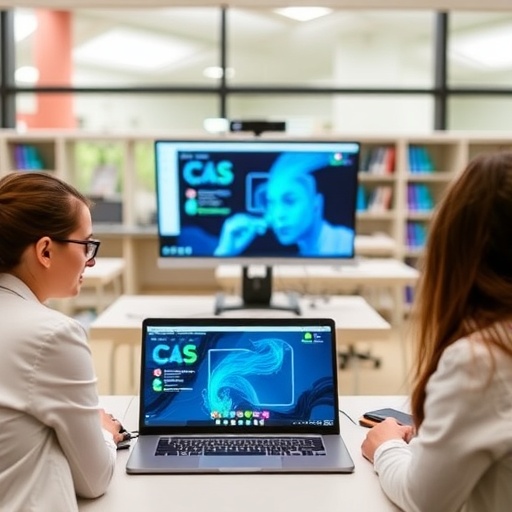In an exciting advancement in medical education, new research highlights the synergistic effects of Problem-Based Learning (PBL) in conjunction with Multi-Disciplinary Teams (MDT) and flipped classroom methodologies in teaching acute coronary syndrome (ACS) to undergraduate medical students. This innovative educational approach aims not only to enhance the understanding of this critical medical condition but also to foster a more collaborative and engaging learning environment. The study, conducted by Lin et al., highlights the pressing need for effective teaching strategies in an era where medical knowledge evolves at breakneck speed and clinicians are required to work efficiently in a team-based setting.
The research outlines the foundational principles of PBL, which focuses on student-centered learning where real-world problems drive the educational process. By placing students in situations that mimic real clinical challenges, educators can cultivate essential skills such as critical thinking, teamwork, and self-directed learning. The integration of MDTs into this model allows students to experience interdisciplinary collaboration firsthand, mirroring the complexities healthcare professionals encounter daily. This approach does not merely enhance knowledge acquisition; it profoundly transforms how medical students engage with and apply that knowledge.
In the study, the flipped classroom model plays a crucial role. This method prompts students to engage with instructional content at their own pace, typically through pre-recorded lectures or reading materials, before class. In the classroom, time is then dedicated to discussions, application of knowledge, and problem-solving exercises. This transition from passive to active learning fosters a more dynamic classroom environment, encouraging students to interact more freely with both their peers and instructors. As a result, students are better prepared for collaborative exercises, particularly in high-stakes scenarios like ACS management.
The combination of these three educational methodologies creates a comprehensive learning experience that addresses both theoretical knowledge and practical application. The study’s findings indicate that students who engaged with this hybrid teaching approach reported increased confidence in their knowledge and skills surrounding ACS. Such confidence is paramount, as it directly correlates with better preparedness for real-world patient interactions post-graduation. The implications extend beyond simple academic performance; they suggest that graduates might be more adept at navigating the complexities of modern healthcare environments.
In addition to individual benefits, this educational approach has the potential to reshape institutional expectations regarding medical training. By demonstrating the efficacy of PBL in conjunction with MDT and flipped classrooms, the study advocates for widespread curricular reforms in medical schools. As educational institutions strive to produce highly competent graduates, embracing these methodologies could lead to a new standard in medical education. Engaging students in a truly integrative and interactive manner paves the way for future healthcare professionals who are not only knowledgeable but versatile and adaptable.
Equally important, the research sheds light on the challenges of implementing such educational models across diverse educational settings. Successful integration may require substantial investments in training faculty to effectively facilitate PBL sessions and manage flipped classroom dynamics. Developing the capacity to form MDTs requires coordination and collaboration among various departments within medical schools. Recognizing these challenges is critical for institutions aiming to modernize their curricula. The responsibility lies with educational leaders to align resources and training opportunities with the innovative approaches outlined in this research.
As more institutions adapt these teaching methods, it will be essential to gather robust data on student outcomes and institutional success. Future studies could assess the longitudinal effects of such educational interventions on students’ ability to deliver quality healthcare, particularly concerning the management of acute conditions like ACS. Measuring success should extend beyond traditional academic metrics; it should also include assessments of students’ readiness for real-world medical challenges and their ability to work efficiently in teams.
Furthermore, ongoing dialogue within the medical education community is necessary for these approaches to thrive. Sharing best practices and challenges faced by early adopters can foster a collaborative environment that accelerates the adoption of effective educational strategies across medical schools globally. Engaging stakeholders in discussions about the future of medical education can only enhance the collective goal of producing well-rounded, proficient healthcare professionals.
This research serves as a reminder of the rapidly evolving landscape of medical education, where innovation is critical to keep pace with the demands of contemporary healthcare. As medical educators seek to enhance learning outcomes and prepare students for the realities of clinical practice, integrating methodologies like PBL, MDT, and flipped classroom will become not only beneficial but essential to training competent medical practitioners. This blend of pedagogy stands to not only reshape educational practices but also improve patient outcomes in the real world, bridging the gap between theory and practice for tomorrow’s healthcare leaders.
In conclusion, the study presented by Lin et al. lays a compelling foundation for the future direction of medical education. As these innovative teaching strategies gain traction, they illuminate a path forward where healthcare education becomes increasingly collaborative and effective in addressing real-world clinical issues. Embracing these methods is not without challenges, but the potential benefits for both students and patients underscore the importance of this transformative approach in modern medicine.
Subject of Research: The effectiveness of PBL combined with MDT and flipped classroom teaching methods in acute coronary syndrome education.
Article Title: The application and effectiveness of PBL combined with MDT and flipped classroom teaching method in acute coronary syndrome education for undergraduate medical students.
Article References: Lin, Y., He, X., Dai, W. et al. The application and effectiveness of PBL combined with MDT and flipped classroom teaching method in acute coronary syndrome education for undergraduate medical students. BMC Med Educ 25, 1559 (2025). https://doi.org/10.1186/s12909-025-08150-2
Image Credits: AI Generated
DOI: https://doi.org/10.1186/s12909-025-08150-2
Keywords: Problem-Based Learning, Multi-Disciplinary Team, Flipped Classroom, Acute Coronary Syndrome, Medical Education, Collaborative Learning, Teaching Methods




